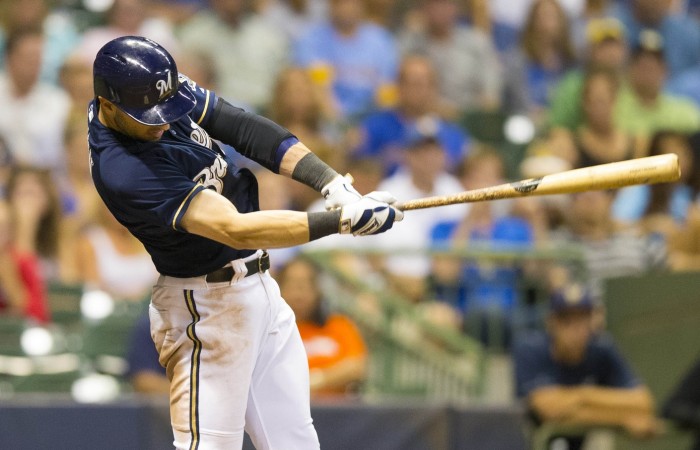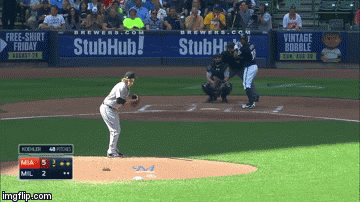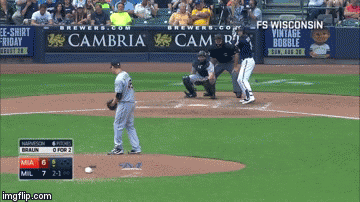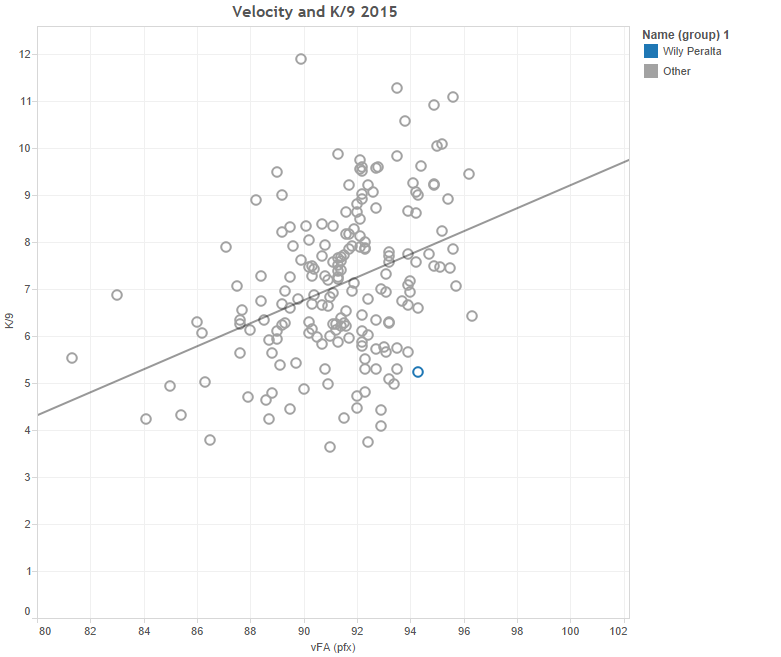WHAT HAPPENED
The game had an ominous beginning. Dee Gordon, the leadoff hitter for the Marlins, singled up the middle. He then stole second base and moved up on a passed ball to third. After a Martin Prado groundout, which scored Gordon, Derek Dietrich doubled. But the first early game blow came from Justin Bour, who hit a monster home run off starting pitcher Willy Peralta. It had an exit velocity of 108 mph and traveled 447 feet, putting the Brewers in an early 3-0 deficit in the first inning.
After the Marlins scored another run in the second to increase their lead to 4-0, Khris Davis showed the Brewers’ first sign of life, crushing a two-run home run to cut the deficit to 4-2. In the third inning, Peralta still was struggling, as he gave up yet another run and put the Brewers down 5-2 going into the bottom of the frame. In the bottom of the third, Ryan Braun walked, which was followed by an Adam Lind single. Khris Davis then came up to the plate and did this:
After an uneventful fourth inning, Peralta struggled in the fifth. He walked the leadoff hitter (Prado). Dietrich then bunted down the third-base line, which Peralta barehanded and threw it to first. The throw struck Dietrich in the back, allowing Dietrich to not only be safe at first base but Prado also moved to third with nobody out. Peralta was able to escape the inning giving up only one run, thus limiting the damage, but at the same time putting the Brewers down by one run.
In the top of the inning Martin Maldonado came up with the bases loaded and one out. He was able to single up the middle on a sharp line drive, driving in a pair of runs and giving the Brewers their first lead of the game. Craig Counsell replaced Peralta in the top of the sixth, and the rest of the game was basically smooth sailing.
Ryan Braun did add another run to the board by hitting his 252nd home run of his career, which made him the Brewers all-time leader in home runs, passing Robin Yount.
TURNING POINT
If you watched this game, the turning point could have been one of two hits. The Maldonado single up the middle, which drove in the winning run, or the Khris Davis three-run homer. Both played a significant part in the win, and without either, the result of the game would’ve been in serious doubt.
The Khris Davis home run, I think, was more significant. The Brewers trailed 5-2 at that point and with Wily Peralta pitching poorly it seemed as though the Marlins were poised to cruise towards the win along with a series sweep. But, with two outs and the first pitch of the at bat, Tom Koehler hung a curveball on the outer part of the plate, which Davis hit for a no-doubter to left-center field. It was his second homer of the day, which not only tied the game but also gave the Brewers much-needed life. Interestingly enough, both of Khris Davis’ home runs came off the first pitch. It was the fifth time he had done that this year, tying him for seventeenth in the league. The league leader in that category (first pitch home runs for 2015) is his teammate, Ryan Braun with 11. He also hit a significant home run later that game.
TWO THINGS TO WATCH
Wily Peralta didn’t pitch well this game; then again, Peralta hasn’t pitched well all year. His 127 DRA- is below average and one of the biggest problems is that he’s not striking anybody out. His 5.24 K/9 is worse than average and among starting pitchers with at least thirty innings pitched, he ranks 169th. Peralta’s K/9 for 2015 would be the lowest of his career, but he’s never been a guy who’s recorded a lot of strikeouts. In fact, the only time he’s even been around the league’s average was in 2012 when he made his major-league debut and recorded a 7.14 K/9. The only problem is that he only pitched 29 innings that season.
This might all seem strange since Peralta is one of the hardest throwing pitchers in all baseball. In his four seasons in the big leagues, Peralta’s average fastball always clocked between 94-95 mph. His fastball velocity since 2012 is ranked eighth among all starting pitchers.
So what gives? Doesn’t velocity have a good relationship with strikeouts? At least that’s the popular narrative. Let’s take a deeper look. The graph below only shows starting pitchers who’ve thrown at least thirty innings. (Peralta is the blue dot)
While fastball velocity does have a positive relationship with strikeouts, it doesn’t mean that throwing hard guarantees a lot of strikeouts. Take Nathan Eovaldi as another example. Since 2012 his average fastball velocity ranks third in all of baseball, yet he owns a career K/9 of 6.31, which is also below average. In most everything there are outliers, and the relationship between velocity and strikeouts is no different. Just because a pitcher throws hard doesn’t mean a pitcher will get a lot of strikeouts. Peralta is just another one of those outliers, and that’s not a good thing. If the right-hander wants to truly improve and earn more consistent success in the big leagues, he’s going to have to start striking out more batters. This doesn’t mean that he needs to be on a Chris Sale level, but at least get above average.



